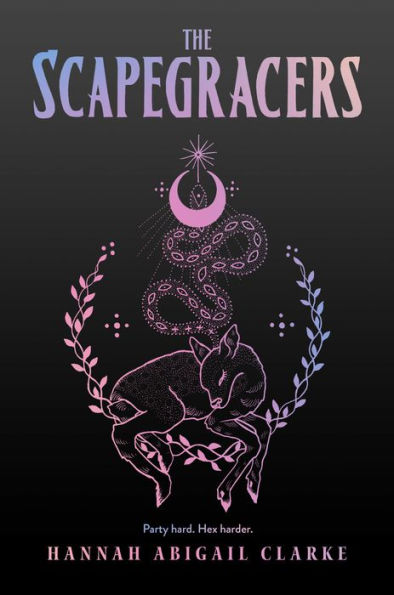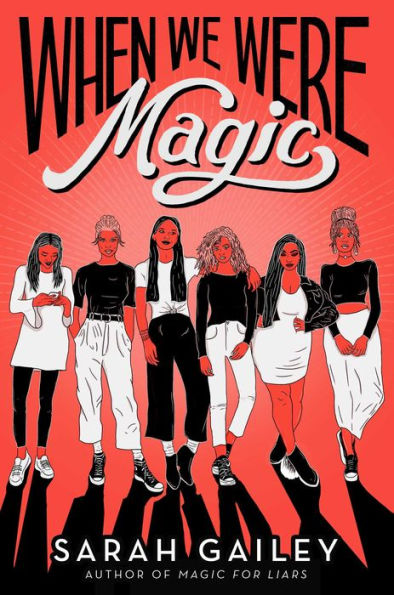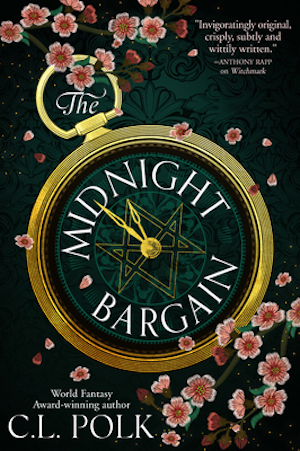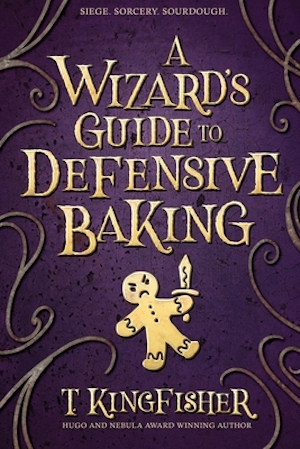Formal educations are a fine thing if you have access to one. But if the field is new and no training exists, or if you are barred from training (for being the wrong gender, wrong class, having no money, etc.), then there is nothing for it but to teach oneself: scavenging for texts (if they exist) and learning by trial and error. Time to heal from mistakes may need to be factored into the curriculum.1 Here are five examples.2
The Scapegracers by Hannah Abigail Clarke (2020)

Sideways Pike is a self-taught witch, an antisocial autodidact of the arcane. She’s smart, she’s determined, and her doting fathers have bought her some grimoires. No, she hasn’t attained powers beyond mortal comprehension, but she’s learned some minor spells that are flashy enough to convince a trio of popular girls to hire her to entertain at a party.
The party is a wild success. The magic dazzles. Sideways makes new friends and develops a massive crush on one of the girls she met at the party. She has also attracted the attention of witch-hunters determined to save Sideways from the evils of magic…even if stripping the magic from Sideways kills her.
***
When We Were Magic by Sarah Gailey (2020)

Marcelina, Roya, Iris, Paulie, Maryam, and Alexis each have a talent for magic. What they don’t have is a teacher.3 They’ve learned a fair bit through experimentation, but they still have an imperfect understanding of the hazards involved—as they find out when Alexis attempts to use magic to seduce Josh: he ends up exsanguinated. And very, very dead.
Alexis is not sure just what went wrong. What she does know is that she and her friends will have to conceal a corpse and clean up a blood-spattered room in a hurry.
***
The Midnight Bargain by C. L. Polk (2020)

If she were a man, Beatrice Clayborn would be trained; she possesses strong natural skills and has the potential to be a great magus. But Beatrice is a woman and in Chasland she will be denied magic until she is past menopause. Even then, what magic she can learn will be strictly circumscribed.
Nevertheless, she persists. There are grimoires, by women for women. Beatrice finds one in a bookstore, a text that will teach her to “summon a greater spirit and propose the pact of the great bargain.” She is one purchase away from achieving her dream…except that Ysbeta Lavan beats Beatrice to the coveted tome.
Too bad for Ysbeta that she cannot read the text she just purchased. Beatrice can. Perhaps an alliance is in order…
***
A Wizard’s Guide to Defensive Baking by T. Kingfisher (2020)

Riverbraid prides itself on its toleration of magickers, even minor ones like Mona, whose talents are limited to baked goods. Because Mona is poor and her magic has no obvious military applications, she’s left to work in her aunt’s bakery. It’s not a bad life, really. Everything changes the morning that Mona finds a corpse sprawled on the floor of the bakery.
The victim is a another magicker. It soon becomes apparent that someone is hunting down the magically talented. Mona’s attempts to unravel the mystery involve her in a desperate resistance against high-level scheming and barbarian invasion. Only a baker can save the day.
***
Worm by John McCrae (2011–2013)
Taylor Hebert doesn’t have magic per se. What she does have is a bona fide superpower and, like the protagonists mentioned above, a comprehensive lack of access to a formal system to help her to master said superpower. Thus, Taylor does what so many have done before her: she makes her own costume before heading out to vanquish evil on the streets and rooftops of Brockton Bay.
At least, that’s the plan. The reality is that Taylor’s ability to control insects is a bit creepy, and her homemade costume is not reassuring. One scuffle later and “Skitter” wins her way into the Undersiders, an ambitious team of superhumans. Or more exactly, supervillains. But hey! At least she’s finally gotten some recognition.
***
No doubt you have your own favourite examples. Feel free to mention them in comments.
In the words of Wikipedia editor TexasAndroid, prolific book reviewer and perennial Darwin Award nominee James Davis Nicoll is of “questionable notability.” His work has appeared in Publishers Weekly and Romantic Times as well as on his own websites, James Nicoll Reviews and Young People Read Old SFF (where he is assisted by editor Karen Lofstrom and web person Adrienne L. Travis). He is a four-time finalist for the Best Fan Writer Hugo Award and is surprisingly flammable.
[1]Do not, under any circumstances, try to stamp out a thermite fire.
[2]There is a Mercedes Lackey novel I would mention except I have forgotten the title. All I remember is the scene in which a boy imbued with powers unknown for a thousand years and cursed as a consequence decides to expand his powers, even though he doesn’t understand why his magic works and he lacks the proper materials. He assumes that anything he does not understand probably is not important. He is interrupted before he can carry out his bold plan. Aw shucks.
[3]If Gailey’s “Magic for Liars” is any guide, even association with a properly accredited college for would-be wizards won’t necessary prevent one from ending up bisected and quite dead on a library floor. (This is very much not a spoiler.)











Tarzan!
@1 Was just about to say that…he’s pretty much the non plus ultra of autodidacts to my mind.
Daughter of Mystery by Heather Rose Jones. So good on so many levels.
Arguably Wizard’s Bane by Rick Cook qualifies.
The protagonist cannot learn how to do the conventional magic, so he has to invent his own!
Possibly Havelock Vetinari, He attended school at the Assassin’s Guild, though it’s unclear how much he benefited from the standard curriculum- his stealth teacher, for instance, having failed him for consistently failing to be found present at roll-call. One of his correspondents, a noted vampire named Lady Margolotta, herself one of the major political masterminds of the Disc, with whom Vetinari spent some time in his youth, is rather amused at the assumption that at that point she had anything to teach him.
In Barbara Hambly’s The Ladies of Mandrigyn, one of the protagonists turns up wizard… except there haven’t been any wizards for mumble years so there’s no one to teach them. Or to tell them what the Great Trial is that unlocks wizards’ full potential, if they survive it…
Flora Segunda has learned what magic she knows from books and what she knows of being an undercover agent from a popular series of adventure novels. It’s a great combination for the reader, but not so great for Flora.
7: The Margaret Rutherford version of Miss Marple, perhaps the least Miss Marple-like Miss Marple, started off as a mystery book fan who really wanted to apply what she’d learned from detective novels to the real world. Her unwilling minion Jim Stringer (played by Rutherford’s doting husband) isn’t entirely sure that this is a good idea.
As the series progresses, it becomes clear this particular Miss Marple has a bewildering assortment of skills, from business management to fencing. Deciding to try detecting made perfect sense in that context, since she has apparently excelled at everything she’s tried. She’s basically Doc Savage, imagined as an elderly British woman.
Thomas Covenant.
What about Madwand by Roger Zelazny? Raised in a high tech world but born in a world of magic he gets transported back to his birth world to discover that he is the heir to a family of very good wizards, but they’re all dead. He has to teach himself magic and ends up getting into a fight with his (step)brother who has discovered technology. Mayhem commences…
Geoffrey R Kieser @10:
“Very good wizards” in the sense of “highly proficient.” His dad wasn’t called “The Devil Det” for nothing!
Plus the changeling that [{rot13}uvf tenaqsngure] did the birth switcheroo with did the same thing, only instead of bootstrapping his innate magic, he bootstrapped his innate engineer / mad scientist.
A shame that Zelazny didn’t continue the series – he left a few plot threads dangling, but nothing came of it.
Diana Wynne Jones’ “Year of the Griffin” is an interesting example of students turning to self education WITHIN a formal education system, because that system is out of date, broken, and not set up to support their diverse individual needs. I loved that book
#12 this is that year, with zoom classes for universities, such strange contexts for classes, meetings, peer communication, etc.
But really, every year is that year – so much of learning is `self learning’, and at best all a teacher does is show their students where the fountains and springs are.
Most of the characters in the Stormlight Archives are self taught in the magic system.
Harrow the Ninth belongs on this list. Harrowhark taught herself right up to the very end, even when at the end, she had instructors.
I have to admit, the inclusion of Worm on this list caught me by surprise.
Jonathan Strange and Mr. Norrell, through different means – at least before they meet and fall into a student-teacher relationship for a bit.
And I’ve only read the first volume of Lev Grossman’s The Magicians trilogy, but there’s at least one example in that too.
A third nomination for Tarzan here. Also, the creature in Frankenstein seems t glean a great deal merely by eavesdropping on a peasant family.
Harold Shea and Reed Chalmers, in Pratt & de Camp’s The Incompleat Enchanter and sequels. Shea puts together what he thinks is a fraudulent ritual (borrowing from various well-known concepts of magic), discovers it works, and develops more ~spells from there; his mentor, Chalmers, has a slightly more calculating approach and sometimes gets more spectacular results — an attempt to replace soured wine ends up with a cask of single-malt.
On the SFnal side, consider Davy Rice in Jumper (the novel. There is no movie.) He doesn’t know how he teleports, but works out all sorts of effective actions from knowing that he can, up to opening a portal to move a flow of water where he wants it.
In Ninth House, Galaxy “Alex” Stern is supposedly an apprentice being prepared to take over preventing the other eight “houses” (Yale “secret societies”) from going too far over the line with their magic — but (as we learn early, because the story multiple times in parallel) her mentor has disappeared, leaving her to figure out too much of what she needs to know (including maybe getting him back) on her own. Not helped by his not being too happy teaching her anyway, because she was semi-feral and has learned some unusual actions, by planned trial or by emergency.
Almost all of Modesitt’s magical protagonists are self taught each seems to experience magic in a different way so the lessons of one aren’t directly transferable to someone else, although the underlying concepts can be.
Not SFF, but Gary Paulsen’s books “Hatchet” and “Brian’s Winter” – a thirteen-year-old boy is in a bush plane crash in the Canadian wilderness and has to figure out how to survive, alone, with only a hatchet his mom gave him before his trip. The author really knows this setting and makes you feel everything.
Aerin in The Hero and the Crown. She finds an old and vague recipe for an ointment against dragonfire and invents some ad hoc chemical engineering to try to rediscover it. I think she does take notes about her failures. Science!
Jame of Hodgell’s books. She would fit “curiosity killed the cat” but she’s not dead, unlike many people around her. (None of whom were cats. Yet.) Always learning something but her star on page moment might be her experimentation on the gods of Tai-Tastigon, leading to the accidental death and deliberate resurrection of one. Off-page, she seems to have read the divine version of the Necronomicon and remembers enough to look stuff up quickly or even reconstruct spells on the fly without it. This is a living book that will kill you horribly if it doesn’t like you but I imagine she read it cover to cover. Perhaps that is why she has amnesia.
Nanoha, of the eponymous anime series, has human/ferret and AI instructors, but practices her magic to a self-punishing degree, inventing her own spells and generally outstripping her curriculum.
Diane Duane’s Young Wizards series – most wizards start out with a self-help book or equivalent (scrolls, prompts from the goddess of cats, etc.) and pick up magic from that, with any training coming much later.
@22: I forgot about Aerin’s experimentation! I need to reread The Hero and the Crown. Knocked my socks off. For that matter, I somehow never read The Blue Sword. I want to do something about that.
Haha, the Blue Sword was literally the most forgettable book I’ve ever read. Read it. Forgot it. Read it, had a sense of deja vu. Forgot it. Read it, had a sense of deja vu, had a sense of deja vu about my deja vu…
Not that it’s a bad book. It just didn’t stick with me when I was young, not in a way where I recognized the cover or title.
In The Fire Sword by Adrienne Martine-Barnes, a modern girl finds herself in a version of Plantagenet England. One that is threatened by magical conquest. It is Elenor’s destiny to Save the Day. To do so, she had to learn magic on the fly.
At one point Eleanor and her partner have to cross the Irish Sea. They hitch a ride on a couple of Orcas. Naturally the whales brought them to Wales.
_______ Frankenstein teaches himself how to read, although it’s arguable that he’s actually remembering something from whoever he got his brain from.
(I think Dean Koontz did something very clever in his retelling when he chose the name Deucalion, but personally I prefer to think of him as Jeremias, after the patron saint of discarded children.)
Jonathan Strange, from Jonathan Strange and Mr. Norrell. Sure, he enters into an apprenticeship of sorts with Norrell, but Norrell keeps most of his knowledge literally locked away from him.
So anything worth learning he learns on his own, and in that way he ends up becoming Norrell’s equal.
@5 – an even better Pratchett example is the book Eric.
There’s also Jonathan Stroud ‘s Simon Lovelace in the Bartimaeus series.
Chris Nuttall’s Zero books. There hasn’t been a “zero” sorcerer in centuries so the heroine has to teach herself how to survive and practice as one. The sequels all involve people teaching themselves.
Some light novels-
Ascendancy of a Bookworm- the librarian heroine dies and finds her mind in the body of a young girl in another world, one that apparently has no books. She desperately wants to read and decides she’s going to have to invent paper and make her own.
Cooking with Wild Food- a young chef is transported to another world where he has to prove his worth to a hunter tribe to survive, so he needs to figure what they can eat and how to cook it.
Loved both The Hero and the Cron and The Blue Sword! I’ve lost count of how many times I’ve read them. Mirasol in Chalice (also by Robin McKinley) is self taught too.
Tarzan taught himself to read without having learned to speak. He was too young for conversation when he lost his parents.
I read that as a kid and thought, “That’s smart. I couldn’t have done that.”
‘Do not, under any circumstances, try to stamp out a thermite fire.’
Please tell me you didn’t learn that from personal experience, James!